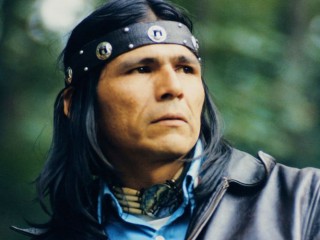
Dennis J. Banks biography
Date of birth : 1937-04-12
Date of death : -
Birthplace : Leech Lake, Minnesota
Nationality : Native American
Category : Famous Figures
Last modified : 2011-02-18
Credited as : Leader, teacher and author, one of the founders of the American Indian Movement (AIM), role in The Last of the Mohicans
As one of the founders of the American Indian Movement (AIM), Dennis Banks (born 1932) has spent much of his life protecting the traditional ways of Indian people and engaging in legal cases protecting treaty rights of Native Americans. He travels the globe lecturing, teaching Native American customs, and sharing his experiences.
Dennis Banks, Native American leader, teacher, lecturer, activist, and author, was born in 1932 on the Leech Lake Indian Reservation in northern Minnesota. In 1968, he helped found the American Indian Movement (AIM), which was established to protect the traditional ways of Indian people and to engage in legal cases protecting treaty rights of Native Americans, such as treaty and aboriginal rights to hunting and fishing, trapping, and gathering wild rice.
AIM has been quite successful in bringing Native American issues to the public. Among other activities, AIM members participated in the occupation of Alcatraz Island, where demands were made that all federal surplus property be returned to Indian control. In 1972, AIM organized and led the Trail of Broken Treaties Caravan across the United States to Washington, D.C., calling attention to the plight of Native Americans. The refusal of congressional leaders to meet with the Trail of Broken Treaties delegation led to the 1972 takeover of the Bureau of Indian Affairs offices in Washington, D.C.
Under the leadership of Banks, AIM led a protest in Custer, South Dakota, in 1973 against the judicial process that found a non-Indian innocent of murdering an Indian. As a result of his involvement in the 71-day occupation of Wounded Knee, South Dakota, in 1973, and his activities at Custer, Banks and 300 others were arrested. Banks was acquitted of charges stemming from his participation in the Wounded Knee takeover, but was convicted of riot and assault stemming from the confrontation at Custer. Refusing to serve time in prison, Banks went underground but later received amnesty from Governor Jerry Brown of California.
Between 1976 and 1983, Banks earned an associate of arts degree at the University of California, Davis, and taught at Deganawidah-Quetzecoatl (DQ) University (an all-Indian controlled institution), where he became the first American Indian university chancellor. In the spring of 1979, he taught at Stanford University in Palo Alto, California.
After Governor Brown left office, Banks received sanctuary on the Onondaga Reservation in upstate New York in 1984. While living there, Banks organized the Great Jim Thorpe Run from New York City to Los Angeles, California. A spiritual run, this event ended in Los Angeles, where the Jim Thorpe Memorial Games were held and where the gold medals that Thorpe had previously won in the 1912 Olympic games were restored to the Thorpe family.
In 1985, Banks left the Onondaga Reservation to surrender to law enforcement officials in South Dakota, and served 18 months in prison. When released, he worked as a drug and alcohol counselor on the Pine Ridge Reservation in South Dakota.
In 1987, Banks was active in convincing the states of Kentucky and Indiana to pass laws against desecration of Indian graves and human remains. He organized reburial ceremonies for over 1,200 Indian grave sites that were disturbed by graverobbers in Uniontown, Kentucky.
In 1988, Banks organized and led a spiritual run called the Sacred Run from New York to San Francisco, and then across Japan from Hiroshima to Hakkaido. Also in 1988, his autobiography Sacred Soul was published in Japan, and won the 1988 Non-fiction Book of the Year Award.
In addition to leading and organizing sacred runs (1988, 1990, 1991), Banks stays involved in American Indian issues, including AIM, and travels the globe lecturing, teaching Native American traditions, and sharing his experiences. He had key roles in the films War Party, The Last of the Mohicans (1992), and Thunderheart (1992). Banks is writing a book on Native American philosophy which will be published in Japan. He is a single parent and lives with his children in Kentucky.
















